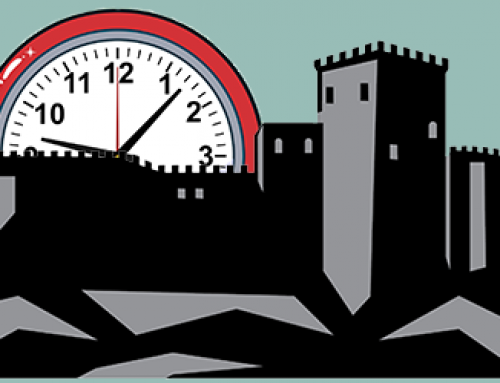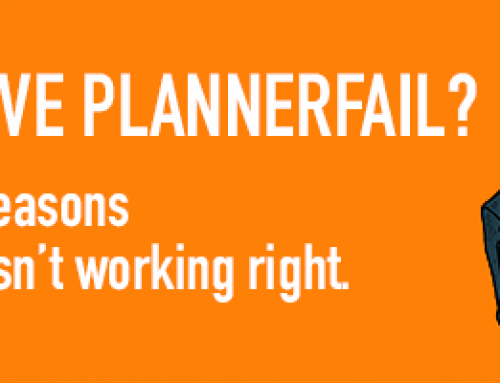Generally speaking, when we change, we experience 4 stages of change. We pass through four phases that are distinct and recognizable. The phases are the Denial Stage, the Resistance Stage, the Exploration Stage, and finally, the Commitment Stage. Let’s discover where you are on your path through.
The surest way to lose your footing is to focus on the wrong thing.
I love to go trail running early in the morning. It’s silent outside this time of day. As the morning light grows I can see mountains above, valleys below, desert spaces—sometimes right next to wetlands filled with cattails and water fowl.
On good days, I scan the horizon and look at fading stars as I run. I look for buds on the trees or for falling leaves. My focus isn’t on the trail, it’s on the scenery.
But on rainy or snowy days, I end up looking just in front of my feet in order to avoid puddles, tree roots, and rocks. I sometimes don’t look up at all!
I find it interesting that on bad weather days my focus is very narrow—and rightfully so, because it’s painful to trip or slip and fall.
One type of day allows a broad focus, and another requires a constant narrow focus.
Most of us have a love/hate relationship with change.
I run outside because I love the changing seasons, the way the light changes with the month, the changing positions of the stars—and yes, even when the weather changes.
But I hate it when, for some reason, a trail is closed and gated off—leaving me to find a different path. Very irritating.
You’ve probably noticed the same thing in your life.
You love some things because they change—like seasons or fashions… and hate other things when they change (are you too young to remember when Coke tried to change its flavor?)
Most people are funny that way:
- We view change that we initiate as needed and valuable.
- But, we resist change that is forced on us—no matter what the change is.
- What’s more, we need predictability—physical, psychological, and social. Predictability is part of our basic need for security.
- But on the other hand, we also need variety, creative outlets, and breaks in routine.
- Which means: we must bring about change without threatening our security.
The Coronavirus paid no attention to that last part. No respect. No respect at all.
Change and preparation.
Basically, it comes to this: we love the changes that we anticipate and feel prepared to make; and we hate the changes we’re not prepared to make. How prepared we feel for change affects how we relate to the change. We’ll come back to how to feel better prepared for change in just a moment.
Being and doing.
When we do something, we naturally like to do it well. And why not? We have a lot of pride in our ability to do things well.
But a problem occurs when we go on to think, “I must be a good or a valuable person because I do ‘this thing’ very well.” We confuse what we do with who we are.
If we’re asked to do something new, something we’re not yet good at, and we make mistakes, how does that make us feel about ourselves?
In fact, we like feeling good about what we do so much that we’d rather keep doing the same old thing that we do well than try doing something new—even if the old thing is obsolete. We continue practicing our present skill and become the best players in a game that’s no longer being played.
Write your name.
Let’s try something. Using a pen or pencil and a piece of paper—see how many times you can write our name in 10 seconds. Ready? Go!
Now, switch hands and try it again.
How many times were you able to write your name the first time? How many times the second?
From this very simple activity we can learn a lot about how we behave when we have to change. Generally, we experience two symptoms. First, there’s a drop in quality of your signatures from the first time to the second. Second, there’s a drop in productivity. You probably wrote your name less times after changing hands.
It’s pretty elementary: our ability to do the new thing isn’t as good as our ability to do the old thing. We don’t do new things well right off the bat, and that makes us feel uncomfortable and unhappy when we have to change to do something new.
Now let’s return to how you might feel a little better prepared for the current change.
It might not impress you to tell you that I’m old. I’ve seen some changes in my lifetime. Some big ones, and lots and lots of small changes that added up to big ones.
I’ve seen black and white TVs replaced by color TVs replaced by smartphones. I’ve seen the sedan replaced by SUVs. I’ve seen straight-legged jeans replaced by bell bottoms, replaced by straight-legged, and back to bell bottoms again. And like most old people, I could go on and on ad nauseam about all the changes I’ve seen. Ad nauseam is a phrase old people use.
If nothing else, it’s given me some observations and perspective on change that, if you’ll indulge an old man, I’d like to share with you.
It might help you to become aware of things on the path that might be coming around the next bend in the trail. It might help you to trust that you can look up at times and appreciate the beautiful springtime before it’s gone.
The 4 stages of changes.
As I mentioned earlier, when we change, we experience four stages of change. We pass through four phases that are distinct and recognizable. The phases are the Denial Stage, the Resistance Stage, the Exploration Stage, and finally, the Commitment Stage.
Now, most of these observations are for changes in general and not specifically applicable to the Coronavirus—but some of it might explain what you’re experiencing right now—so apply as needed.
In the beginning: Homeostasis.
A few months ago, we were all at work or home… moving along, making plans, doing our jobs, and maintaining the status quo. Comparatively speaking, experiencing very little stress. Our focus was on the horizon, or the sky, or maybe even zoned out because most of us felt we were familiar with the path we were on.
Then things got weird and confusing.
It jerked us out of our lull. Lull is another word old people use—look it up. (Look it up is an old way of saying “Google it.”)
And so it begins…
The Denial Stage.
What happens to our stress level when the trail takes a sudden, unexpected change?
What you might read or hear in the Denial Stage.
In the Denial Stage we hear people say:
- Really? They don’t really mean it.
- It can’t happen here.
- Oh, it’ll never happen.
You might hear people talking in nostalgic ways about:
- How good things were.
- Maybe the old way wasn’t so bad.
What you might feel in the Denial Stage.
- Sadness.
- Worry.
- Withdrawn.
- Confusion.
- Numbness.
- Refusal to hear new information or can’t get enough new information.
- Betrayed or hurt.
- Immobilized or paralyzed.
What might happen in the Denial Stage.
- Complaints.
- Errors.
- Anger.
- Stubbornness.
- Apathy.
- Increase absence due to illness.
- Withdrawal.
- Low productivity.
It’s important that you understand that all of those symptoms are natural responses—that doesn’t make them right or wrong, but it helps to identify what stage of change we’re in.
The Denial Stage is the flight instinct—but the next stage, the Resistance Stage is the fight instinct.
The Resistance Stage.
Sometimes during a stressful change our feelings emerge in ways that really surprise us. In the change process, this emergence of emotion is called the Resistance Stage.
What you might feel in the Resistance Stage.
- We don’t have enough information to understand the implications of the change.
- Anger (anger shows up a lot, doesn’t it?).
- Hurt.
- Loss.
Speaking of loss, we often feel that we lose:
- Security.
- Control.
- Responsibility.
- Status.
- Authority.
- Friends.
- Workplace.
- Money.
- Or simply, the old way of doing things.
What might happen in the Resistance Stage.
- Expectations are disrupted.
- Sense of security is threatened.
- Feel powerless and anxious (so we buy an abundance of toilet paper. Go figure.)
- Feel awkward, unprepared, embarrassed, afraid we might look foolish (so we buy even more toilet paper.)
Some passive resistance behaviors might be:
- Withholding information.
- Foot dragging.
- No confrontation—but no productivity either.
- Not attacking the change—but not supporting it.
- Overcomplicating the new way.
Some active resistance behaviors might be:
- Deliberate opposition.
- Reduction in output.
- Chronic quarrels.
- Sullen hostility.
- Frustration: “Why this won’t work!”
- Agitating others.
- Not reporting problems.
- Now acknowledging problems.
Resistance can be very destructive. A lot of damage can be done in this stage. These feelings and behaviors are very negative and destructive. We don’t like being around people who act like this and we don’t like ourselves when we feel like this.
There are some things we can do, however that can reduce the amount of stress that we feel in these first two stages. They may not eliminate the stages, but they will decrease the stress.
To better understand and participate in change, we need a long-term perspective. We need to intentionally move to the Exploration Stage.
The Exploration Stage.
We need to explore what we know and discover what we don’t know. We need to ask questions and gain some clarity.
We need some tools to create a safe place to explore and to ask questions. One of the tools we can use to guide us through a change is to explore the Opportunities, Dangers, and Interesting Points. How to do that is explained in this blog.
Explore the answers to specific questions.
- What exactly is changing? Be as specific as possible.
- What is the current situation like?
- What was it like before the change?
- What do I imaging things will be like when the change is over?
- How much of this perception is based on fact?
- What am I feeling right now about the change?
- What specifically don’t I understand about the change?
- Is there someone I should I ask in order to gain more understanding about the change?
- How does the change directly affect my job? My family? My friends? My community?
- What specifically will I have to do differently?
- Does the change require new skills?
- What will I need to know that I don’t know now?
- How will I learn the new skills?
- What is the worst thing that could happen to me because of this change? Worst-case scenario.
- What is the best thing that could happen to me because of this change? Best-case scenario.
If you’re still feeling a little stuck, do the exercises in this blog. Or, try answering the questions in this blog.
As we begin exploring the possibilities and opportunities instead of just concentrating on feelings and emotions, we allow ourselves to become more familiar with the unknown—and we don’t fear the familiar.
What might happen in the Exploration Phase.
- Feel more energy.
- Goals and vision become clearer.
- Explore alternatives.
- Desire to gain new skills.
The Commitment Stage
The final stage is called the Commitment Stage. Often our stress level returns to where it was before the change (hopefully, that means low stress).
What we might feel in the Commitment Stage.
- More traction or commitment in getting things done.
- Things are clearer, less confusing.
- An understanding of our new roles we might have.
- Focused on being and doing the new thing.
- Stronger commitment to community, teamwork, family.
- More balance in our lives.
Another thing from olden days…
Manual transmissions in cars. We used to have to shift the gears in a car in order to go faster. Imagine we’re driving a car as fast as we can. Pedal to the metal. There’s lots of heat and lots of sound—but not lots of speed.
What should we do? That’s right, shift gears.
The gear that got us to this point is now the gear that’s holding us back. We need to shift into a new gear. So long as we don’t shift or change, we’ll never progress past a certain point. We don’t need to press harder on the pedal that’s already floored—we need to shift gears.
In life, as in auto racing, what matters is the next turn and how fast we get around it—not the last turn. In many ways, change not only requires us to adapt and learn new things—it also requires us to unlearn old ways of thinking and doing things.
Now, let’s go outside. It’s springtime. Look up. Look out. Be safe. We’ll get through this. After all, the best way out is always through.






